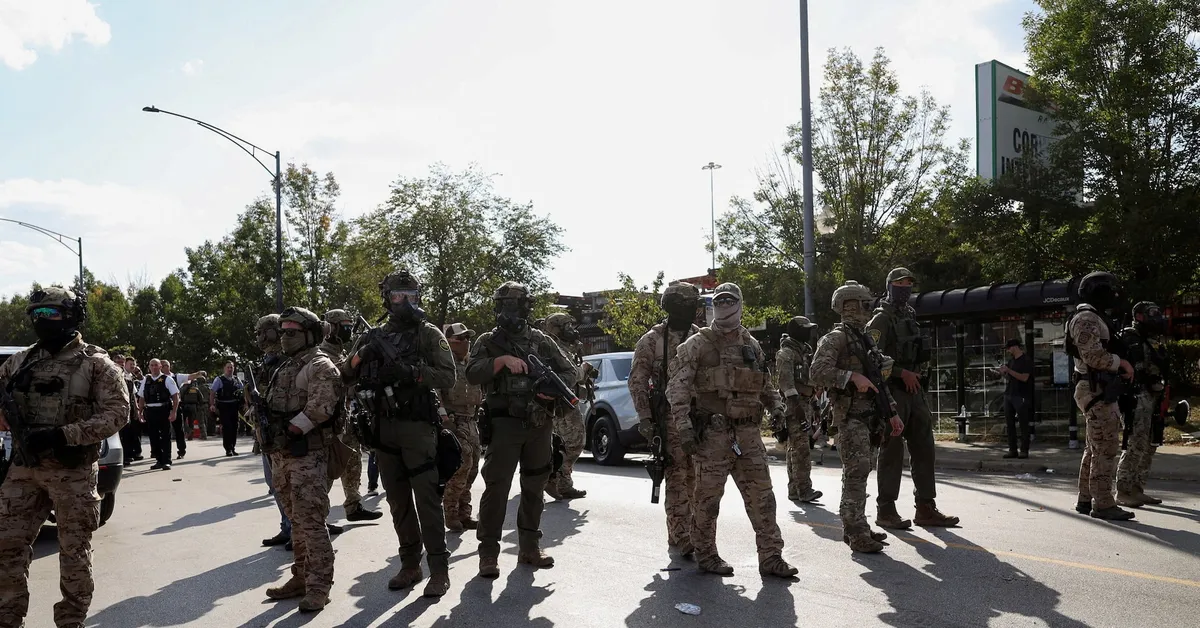
On October 8, 2023, approximately 500 National Guard troops were deployed near Chicago following orders from President Donald Trump. This decision has faced significant backlash from local leaders, including Chicago Mayor Brandon Johnson and Illinois Governor JB Pritzker, who have condemned the militarization of their city as an unnecessary provocation. Trump's controversial actions come amidst heightened tensions regarding immigration enforcement and public safety in Democratic-leaning urban areas.
In a pointed response, President Trump has called for the jailing of both Mayor Johnson and Governor Pritzker, despite neither being accused of any criminal offenses. Both leaders have emerged as vocal opponents of Trump's stringent immigration policies and the deployment of the National Guard in cities like Chicago. Trump's inflammatory remarks reflect a broader strategy aimed at criminalizing dissent among political opponents.
While the Trump administration has raised alarms about what they describe as lawless and violent protests in cities such as Chicago and Portland, the reality on the ground tells a different story. Demonstrations against Trump’s immigration policies have largely been peaceful and relatively small in scale, contradicting the administration's portrayal of urban unrest as a war zone.
On the day of the deployment, the National Guard confirmed that around 200 soldiers from Texas and 300 from Illinois had assembled in the Chicago area. Their primary mission is to protect federal personnel, including ICE agents, and safeguard federal properties across the city. This heightened military presence has raised concerns among residents, particularly in neighborhoods with large Latino and Black populations, where immigration enforcement has been particularly aggressive.
At an immigration facility in Broadview, Illinois, just outside Chicago, a small group of demonstrators gathered, holding signs and chanting slogans in front of a wall of heavily armed officers. Despite the National Guard's potential presence at the facility, no troops had been dispatched by early afternoon on that day. Meanwhile, downtown Chicago continued to see normal commuter activity, albeit accompanied by the frequent drone of helicopters, a constant reminder of the federal government's increased military presence since the Trump administration's recent actions.
Mayor Johnson, in response to Trump's remarks, defended his position by signing an executive order that establishes an ICE Free Zone in Chicago, prohibiting federal immigration agents from conducting operations on city property. Johnson’s stance reflects a growing resistance against Trump's administration, which has been characterized by its aggressive tactics towards perceived political adversaries. Governor Pritzker echoed Johnson's sentiments, stating he would not yield to Trump’s demands.
As the situation unfolds, legal battles over the deployment of the National Guard are heating up. Federal courts have imposed certain restrictions on the Trump administration's unprecedented use of National Guard troops in states where governors have expressed opposition. Additionally, Trump has threatened to invoke an anti-insurrection law to bypass any court orders that might impede his directives. In the coming days, two significant court hearings will take place: one in Illinois to discuss a temporary halt to the National Guard's deployment in Chicago, and another in California regarding Trump's initial appeal over troop deployments in Portland.
A recent Reuters/Ipsos poll indicates that a majority of Americans oppose the deployment of National Guard troops unless there is an external threat. Despite the narrative pushed by Trump's administration, violent crime has been on a decline in many U.S. cities since a spike during the COVID-19 pandemic, raising questions about the necessity of military intervention in urban crime control.
In conclusion, the deployment of National Guard troops in Chicago has ignited a fierce debate about immigration enforcement, public safety, and the militarization of urban areas under the Trump administration. As legal challenges loom and community responses evolve, the implications of these actions will likely reverberate far beyond the streets of Chicago.